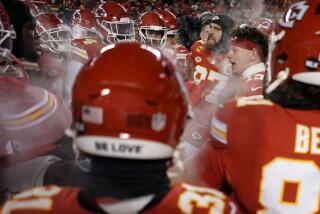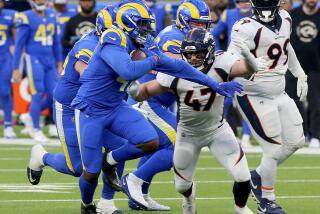Pro Football Notes : NFL Likely to Keep Instant Replay
Unless Commissioner Pete Rozelle has lost his clout with the NFL owners, instant replay will probably remain with us.
At the league meetings in Hawaii starting March 16, Rozelle is expected to make a strong pitch to retain the system, which had problems in its first experimental year. It is considered by league officials to be an overall success. In the past, such recommendations from the top have usually been heeded.
To be retained, replay must have the votes of 21 of the 28 teams. One recent survey indicated that four teams--the same number that voted no last year--are against it with five undecided.
Tex Schramm, chairman of the Competition Committee and replay’s foremost proponent, believes he can get enough votes to put it in permanently. His fallback position is to continue it experimentally for another year.
“In the second half of the season, the system showed it would work,” Schramm says. “We didn’t have the glitches we had at the start. We didn’t hurt anyone the whole season.”
The Kansas City Chiefs, Minnesota Vikings and Denver Broncos might argue with that. Each had games--in Denver’s case the Super Bowl--in which instant replay failed to detect bad calls that were allowed to stand.
But Schramm notes that without replay those calls would have stood anyway, which is the position Rozelle will cite. He also will note polls that show the public favors replay.
If the past is any guide, that should be enough.
Don’t look for major rules changes out of the Maui meetings. But look for some talk about future changes to help offense at the expense of defense.
Two years ago, an average of 43.7 points were scored in NFL games. In 1985, that declined about a point and this year the average was just over 41--it was at 40 for most of the season, and made it over the 41 mark the final week with scores like 55-24, 52-21, 47-17 and 41-16 in games involving teams that had little incentive.
The defensive cycle is the natural response to the offensive cycle that began in 1974, when, faced with a 34-point-per-game average, the league began trying to encourage offense. The main blow came in 1978 with the liberalization of pass blocking and rules that made pass defense tougher.
“Historically, defense always catches up with the offense,” Schramm says.
“In this case, teams seem to have made up for the limits on pass defense by figuring out ways to put more pressure on quarterbacks. That’s fine if we stay up in the 41-point area, but if it starts to go down into the 30s, that’s when you get concerned. When you see these trends start, you want to watch them.”
Move the New England Patriots up with Cleveland, Denver and Seattle as AFC favorites. They did it with the acquisition of guard Sean Farrell from Tampa Bay last week for second, seventh and ninth-round draft choices.
Farrell, basically, is the replacement for the retired John Hannah at left guard.
Although injuries contributed, Hannah’s absence was the principal reason the Patriots went from sixth in the NFL in rushing in 1985 to last in 1986 and the reason that Brian Holloway, who played next to him, fell off after two straight Pro Bowl trips.
Farrell may not be Hannah, but he’s one of the better guards in the league and came cheap--he was worth a No. 1. He should also be motivated by leaving Tampa Bay, which is what he wanted badly.
With the NFL in the midst of contract negotiations with the television networks, the rumors have been flying. That’s particularly true with cable and other non-network bidders seriously in the running for the first time.
So it was that Val Pinchbeck, the league’s director of broadcasting, got a call last week asking him to confirm that ABC had signed for 16 Monday nights; Home Box Office for five Thursday nights and a cable consortium for eight Sunday nights.
“What about Tuesdays?” Pinchbeck asked him.
The reporter didn’t laugh.
Call the coach of the Super Bowl champions Bill (No Frills) Parcells.
The NFL and promoters in London, the likely site of this summer’s European showcase, want the game to be a replay of the Super Bowl between the Broncos and Parcells’ Giants. But the Giants are balking.
The reason: Parcells doesn’t give a hoot about show biz, preferring not to add one more distraction to the post-Super Bowl hoopla that is one reason no NFL champion has repeated in seven years. Rather than go overseas, he’d prefer to remain at Pleasantville, N.Y., running off whatever residue remains from the rubber chicken circuit.
So far, he’s got the backing of his front office.
But NFL sources suggest that if Rozelle were to whisper “good of the league” to co-owner Wellington Mara the Giants would go overseas.
So British fans may well get a quarter of a rusty Phil Simms vs. a rusty John Elway and three quarters of rookies and free agents muddling around. And probably not know the difference.
Hugh Culverhouse has decided to spend some bucks on his Bucs.
Not only has he given Ray Perkins a $750,000 contract to put some life in a moribund team but he’s authorized Perkins to pay for beef on his players--$50 per day for anyone who participates in the team’s off-season weight program three or four days a week.
More to Read
Go beyond the scoreboard
Get the latest on L.A.'s teams in the daily Sports Report newsletter.
You may occasionally receive promotional content from the Los Angeles Times.










